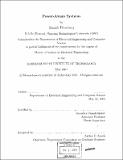Power-aware systems
Author(s)
Bhardwaj, Manish, 1976-
DownloadFull printable version (7.123Mb)
Other Contributors
Massachusetts Institute of Technology. Dept. of Electrical Engineering and Computer Science.
Advisor
Anantha Chandrakasan.
Terms of use
Metadata
Show full item recordAbstract
In this thesis, we formalize the notion of power-aware systems and present a methodology to systematically enhance power-awareness. We define a power-aware system as one which scales its power consumption with changes in its operating scenario with a view to maximizing its energy efficiency. Operating scenarios are primarily characterized by five dimensions - input statistics, output quality requirements, tolerable latency (and/or throughput constraints), internal state and environmental conditions. We quantify the power-awareness of a system by equating it to the energy efficiency with which it can track changes along these dimensions. This is done by comparing the system's energy consumption in a scenario to that of a dedicated system constructed to execute only that scenario as energy efficiently as possible. We then propose a systematic technique that enhances the power-awareness of a system by composing ensembles of point systems. This technique is applied to multipliers, register-files, digital filters and variable-voltage processors demonstrating increases in battery-lifetimes of 60%-200%. In the second half of this thesis we apply power-awareness concepts to data-gathering wireless networks. We derive fundamental bounds on the lifetime of networks and demonstrate the tightness of these bounds using a combination of analytical arguments and simulation. Finally, we show that achieving a high degree of power-awareness in a wireless sensor network is equivalent to optimally or near-optimally solving the role-assignment problem. Provably optimal role assignment strategies using linear programming are presented. Hence, optimal strategies can be determined in a time that is polynomial in the number of nodes. As a result of applying power-awareness formalisms, the energy efficiency, and hence the lifetime of data gathering networks increases significantly over power-unaware schemes.
Description
Thesis (S.M.)--Massachusetts Institute of Technology, Dept. of Electrical Engineering and Computer Science, 2001. Includes bibliographical references (p. 147-156).
Date issued
2001Department
Massachusetts Institute of Technology. Department of Electrical Engineering and Computer SciencePublisher
Massachusetts Institute of Technology
Keywords
Electrical Engineering and Computer Science.